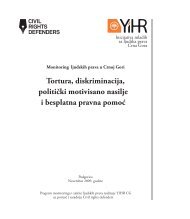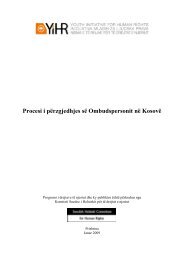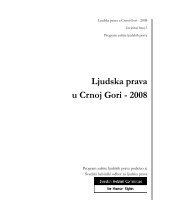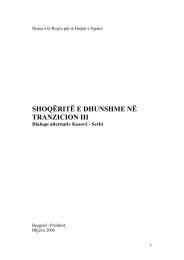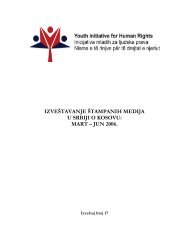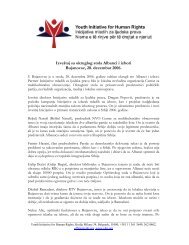Implementation of Transitional Laws in Serbia 2006
Implementation of Transitional Laws in Serbia 2006 - Archive
Implementation of Transitional Laws in Serbia 2006 - Archive
- No tags were found...
Create successful ePaper yourself
Turn your PDF publications into a flip-book with our unique Google optimized e-Paper software.
<strong>Implementation</strong> <strong>of</strong> <strong>Transitional</strong> <strong>Laws</strong> <strong>in</strong> <strong>Serbia</strong> <strong>2006</strong>Conclusions on the <strong>Implementation</strong> <strong>of</strong> the Law onthe Protector <strong>of</strong> CitizensAfter research<strong>in</strong>g the implementation <strong>of</strong> the Law on the Protection <strong>of</strong>citizens, the Initiative reached the follow<strong>in</strong>g conclusions:• The Assembly did not adhere to the legally stipulated six monthdeadl<strong>in</strong>e for appo<strong>in</strong>t<strong>in</strong>g the Protector.• The whole procedure <strong>of</strong> nom<strong>in</strong>at<strong>in</strong>g and appo<strong>in</strong>t<strong>in</strong>g the Protectorwas not very transparent and as a consequence the Assembly’sConstitutional Board, without public debates and wider support<strong>of</strong> the pr<strong>of</strong>essional circles and the public, nom<strong>in</strong>ated Sasa Jankovicfor the Protector – national legal adviser <strong>in</strong> the DemocratizationUnit <strong>of</strong> OSCE <strong>in</strong> <strong>Serbia</strong> and Montenegro.• Sasa Jankovic was the only candidate nom<strong>in</strong>ated for the Protector<strong>of</strong> citizens, although the Law stipulates that each Parliamentcaucus can nom<strong>in</strong>ate their candidate. As a result, political partiesdemonstrated grave irresponsibility towards responsibilities thatthey, as caucuses, have. The Assembly’s Constitutional Boardwhich was supposed to consider caucuses’ proposals, was last <strong>in</strong>session on May 30 th 2005, four months before the Law on theProtector <strong>of</strong> citizens was adopted.• The shortcom<strong>in</strong>g <strong>of</strong> the Law is that it does not leave thepossibility for the organizations and <strong>in</strong>stitutions already <strong>in</strong>cluded<strong>in</strong> the monitor<strong>in</strong>g, protection or promotion <strong>of</strong> human rights andfundamental freedoms to submit their proposals for the Protector,but gives that possibility only to Assembly’s caucuses.• Relative majority is needed for the election <strong>of</strong> the Protector, i.e.the majority <strong>of</strong> MPs present. Although this is <strong>in</strong> keep<strong>in</strong>g withthe Constitution, this procedure can cause the public to questionProtector’s <strong>in</strong>dependence and autonomy. Certa<strong>in</strong> laws <strong>in</strong> the regionenvisage absolute majority, i.e. the majority <strong>of</strong> total number <strong>of</strong>MPs, or two-thirds majority for the election <strong>of</strong> the Protector.• The Law does not envisage that the Protector or certa<strong>in</strong> number<strong>of</strong> his deputies have to be members <strong>of</strong> national m<strong>in</strong>oritiesliv<strong>in</strong>g <strong>in</strong> <strong>Serbia</strong> or that some <strong>of</strong> them should be females. Thissolution is encompassed with<strong>in</strong> the Act on the Institution <strong>of</strong>the Ombudsman <strong>in</strong> Kosovo, which is <strong>in</strong> l<strong>in</strong>e with the current90



